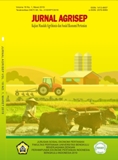Main Article Content
Abstract
This study aims to determine the role and level of importance, level of strength and level of legitimacy in food self-sufficiency programs implemented in the region. Food self-sufficiency is a food security program that is very important so that the program involves many stakeholders and the role of each stakeholder in the success of the program. This study uses a stakeholder management approach in the data analysis used. This research was conducted in North Bengkulu Regency in the UPSUS PAJALE program. The results of the study are the role of the local government stakeholders, the Food Crops and Extension Agency has a high level of importance, strength and level of legitimacy compared to other stakeholders so that the level of coordination and collaboration between stakeholders is needed so that the UPSUS PAJALE program can run smoothly and successfully.
Keywords
Article Details
Copyright (c) 2019 Adis Imam Munandar, Achmad Hafid

This work is licensed under a Creative Commons Attribution-ShareAlike 4.0 International License.
Authors who publish with this journal agree with the following terms:
- Authors retain copyright and grant the journal right of first publication with the work simultaneously licensed under a Creative Commons Attribution-ShareAlike 4.0 International License that allows others to share the work with an acknowledgment of the work's authorship and initial publication in this journal.
- Authors are able to enter into separate, additional contractual arrangements for the non-exclusive distribution of the journal's published version of the work (e.g., post it to an institutional repository or publish it in a book), with an acknowledgment of its initial publication in this journal.
- Authors are permitted and encouraged to post their work online (e.g., in institutional repositories or on their website) prior to and during the submission process, as it can lead to productive exchanges, as well as earlier and greater citation of published work (See The Effect of Open Access).
- This work is licensed under a Creative Commons Attribution-ShareAlike 4.0 International License.
References
- Badan Pusat Statistik 2010 Indonesia Dalam Angka 2010. BPS Indonesia dalam angka.
- Badan Pusat Statistik 2012 Bengkulu Utara Dalam Angka Tahun 2012. BPS Kab.Bengkulu Utara.
- Badan Pusat Statistik 2013 Bengkulu Utara Dalam Angka Tahun 2013. BPS Kab.Bengkulu Utara.
- Badan Pusat Statistik 2014 Bengkulu Utara Dalam Angka Tahun 2014. BPS Kab.Bengkulu Utara.
- Badan Pusat Statistik 2015 Bengkulu Utara Dalam Angka Tahun 2015. BPS Kab.Bengkulu Utara.
- Badan Pusat Statistik 2016 Bengkulu Utara Dalam Angka Tahun 2016. BPS Kab.Bengkulu Utara.
- Clarkson, M.B. 1995. A Stakeholder Framework for Analyzing and Evaluating Corporate Social Performance. Academy of Management
- Clealand,David. I, 1995. Project Management Strategic Design and
- Implementation. Singapore: MCGraw-Hill.
- Creswell, John W., 2008. Research Design: qualitative, quantitative, and mixed methods approach 4th ed. SAGE Publications, Inc
- Freeman, R. E. 1984. Strategic management: A stakeholder approach. Boston: Blackwell Publishing.
- Freeman, R.E. 1997 Stakeholder Theory in: Werhane, P.H. &
- Freeman, R.E. (eds.), Blackwell Encyclopedia of Business Ethics. Oxford: Blackwell.
- Freeman, R.E. 1999 Divergent Stakeholder Theory, in: Academy of Management.
- Freeman, J. 1999. Stakeholder Influence Strategies, in: Academy of Management.
- Herdiasti. 2012. Penyuluhan Pertanian. Yogyakarta: Kanisius.
- Hermans dan Thissen. 2009. Actor analyis methods and their use for public policy analysists. European Journal of Operational Research. 196(2), 808-818
- John M Bryson, 2004. Stakeholder Identification n Analysis Techniques, In Hubert Humphery Institute Of Public Affair.
- Manulang S, 2018. Teori dan Teknik Analisis Stakeholder, (Bogor: PT Penerbir IPB Press, 2018).
- Manulang S, 2018. Teori dan Teknik Analisis Stakeholder, Bogor: IPB Press.
- Pouloidi, Athanasia dan Edgar. A. Whitley 1997. Stakeholder identifikacation in organizational sytem. European Journal of Information Systems. 6 (1): 1-14
- Suparta, 2010. Analisis komparasi usahatani padi sawah Metode SRI (system of rice intensification) dan konvensional Di kecamatan gerih kabupaten ngawi. Program Studi Magister Manajemen Agribisnis, Universitas Pembangunan Nasional “VETERAN”. Surabaya.
References
Badan Pusat Statistik 2010 Indonesia Dalam Angka 2010. BPS Indonesia dalam angka.
Badan Pusat Statistik 2012 Bengkulu Utara Dalam Angka Tahun 2012. BPS Kab.Bengkulu Utara.
Badan Pusat Statistik 2013 Bengkulu Utara Dalam Angka Tahun 2013. BPS Kab.Bengkulu Utara.
Badan Pusat Statistik 2014 Bengkulu Utara Dalam Angka Tahun 2014. BPS Kab.Bengkulu Utara.
Badan Pusat Statistik 2015 Bengkulu Utara Dalam Angka Tahun 2015. BPS Kab.Bengkulu Utara.
Badan Pusat Statistik 2016 Bengkulu Utara Dalam Angka Tahun 2016. BPS Kab.Bengkulu Utara.
Clarkson, M.B. 1995. A Stakeholder Framework for Analyzing and Evaluating Corporate Social Performance. Academy of Management
Clealand,David. I, 1995. Project Management Strategic Design and
Implementation. Singapore: MCGraw-Hill.
Creswell, John W., 2008. Research Design: qualitative, quantitative, and mixed methods approach 4th ed. SAGE Publications, Inc
Freeman, R. E. 1984. Strategic management: A stakeholder approach. Boston: Blackwell Publishing.
Freeman, R.E. 1997 Stakeholder Theory in: Werhane, P.H. &
Freeman, R.E. (eds.), Blackwell Encyclopedia of Business Ethics. Oxford: Blackwell.
Freeman, R.E. 1999 Divergent Stakeholder Theory, in: Academy of Management.
Freeman, J. 1999. Stakeholder Influence Strategies, in: Academy of Management.
Herdiasti. 2012. Penyuluhan Pertanian. Yogyakarta: Kanisius.
Hermans dan Thissen. 2009. Actor analyis methods and their use for public policy analysists. European Journal of Operational Research. 196(2), 808-818
John M Bryson, 2004. Stakeholder Identification n Analysis Techniques, In Hubert Humphery Institute Of Public Affair.
Manulang S, 2018. Teori dan Teknik Analisis Stakeholder, (Bogor: PT Penerbir IPB Press, 2018).
Manulang S, 2018. Teori dan Teknik Analisis Stakeholder, Bogor: IPB Press.
Pouloidi, Athanasia dan Edgar. A. Whitley 1997. Stakeholder identifikacation in organizational sytem. European Journal of Information Systems. 6 (1): 1-14
Suparta, 2010. Analisis komparasi usahatani padi sawah Metode SRI (system of rice intensification) dan konvensional Di kecamatan gerih kabupaten ngawi. Program Studi Magister Manajemen Agribisnis, Universitas Pembangunan Nasional “VETERAN”. Surabaya.
